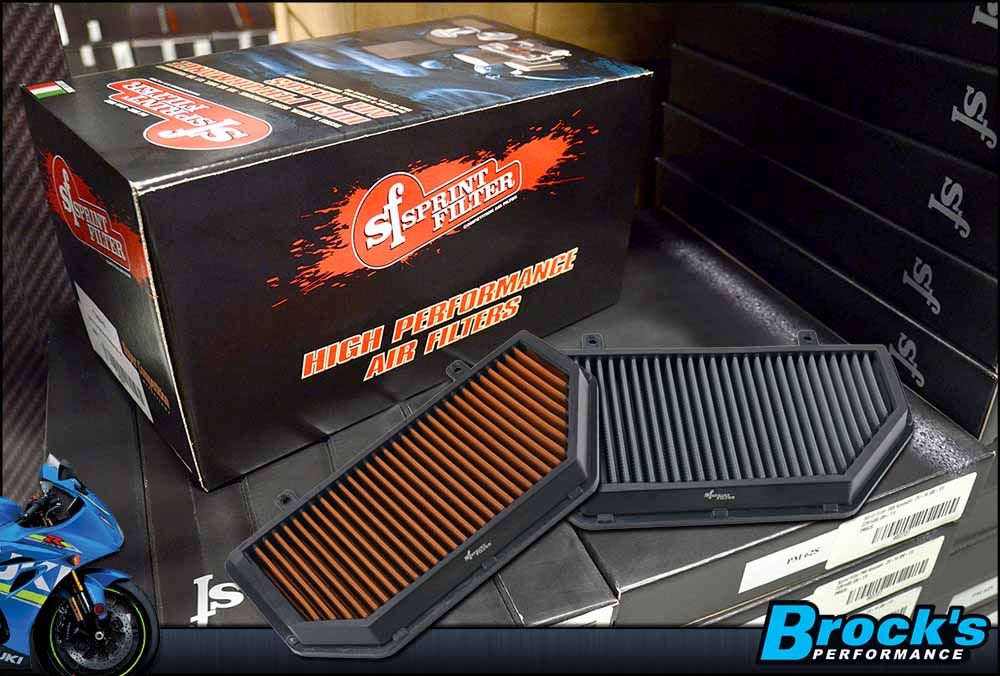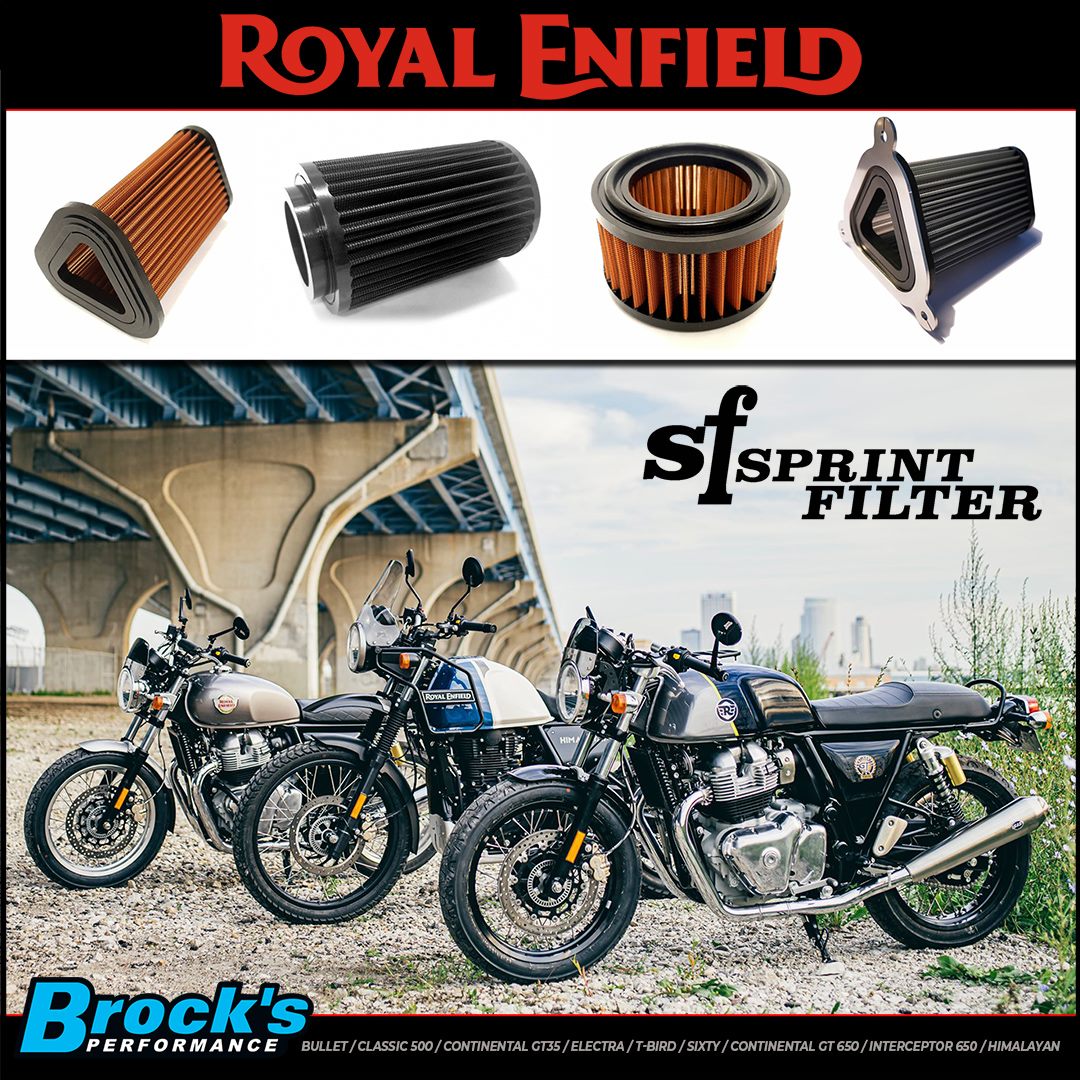Whether it's due to style, performance, or efficiency upgrades, many people choose to customize their bikes with modifications. From new wheels to air filters, there are a lot of aftermarket products designed to achieve your goals. In particular, many motorcycle owners have chosen to upgrade their stock air filters for a better option.
Why would someone want to change out their air filter? Upgrading to a better air filter has a lot of advantages over a stock filter. Plus, there are many performance benefits from choosing an aftermarket air filter that could make riding better and more enjoyable. We'll dive deeper into aftermarket air filters, including their advantages over stock options, overall benefits, and popular products to choose from.

The Importance of Motorcycle Air Filters
Why are motorcycle air filters so important? While they may not seem like the most important feature on your motorcycle, air filters play a critical role in the functioning of your bike. While you're out riding, air must pass through into the combustion chamber. The air filter acts as a protective barrier filtering out all of the dirt, debris, and other contaminants in the air. Clean air is then passed through into your engine. Without the filter, your engine parts will become damaged with all of the dirt.
How does an upgrade air filter affect your motorcycle? Along with other engine factors, having an upgraded air filter can increase your bike's horsepower. When more clean air is let into the combustion chamber, it will allow for a bigger explosion, which in turn creates more horsepower. If you're looking to improve the power and fuel efficiency of your bike, you'll need to keep your filters clean and in proper working order.
The Different Types of Air Filters
Generally, there are several different types of air filters available, including paper, gauze, and foam. For road bikes, the most typical stock or OEM (original equipment manufacturer) filters use paper. This type of filter adequately blocks out particulates but doesn't provide the best airflow. Furthermore, it's not reusable and gets clogged up fairly quickly. For environments with a lot of pollutants, this means that you'll likely have to spend money on replacement filters fairly often.
Oiled cotton gauze filters are one of the most common aftermarket air filters. They have many advantages over paper filters, including better airflow. With better airflow also comes many other performance benefits, such as more horsepower, better throttle response, improved fuel efficiency, and more torque. You'll also find polyester filters are common for performance bikes and racing. These types of filters work even more efficiently than cotton to filter out debris and allow for maximum airflow.
The other option is oiled foam filters. This type of filter is ordinarily used on off-road bikes. It's commonly used on off-road bikes because it's adept at operating in dusty conditions. It will be more equipped to filter all of the dirt and particulates that kick up from riding dirt trails than the other two filter options. However, it's not commonly used for road bikes because maintaining the filter is a hassle. You'll need to clean the filter after every use, which isn't ideal for most motorcycle riders.
The Advantages of Aftermarket Air Filters Over Stock Filters
Though stock and aftermarket air filters share the same goal of blocking out particulates, there are some slight differences in material quality. For example, the materials used in aftermarket air filters are generally oiled cotton material or polyester. In contrast, OEM air filters are typically made out of paper.
What does material quality mean for the filters? Between the two air filter options, you'll notice some clear advantages of using an aftermarket air filter. Aftermarket air filters not only filter out dirt and other contaminants that could damage the engine but they also maximize air flow. Stock air filters don't have this advantage, as they are quite basic in their functionality. This means that paper filters don't allow for the same kinds of benefits as aftermarket filters because of the lack of airflow.
Better Airflow
One of the main advantages of aftermarket filters over OEM filters is better airflow. This feature causes many other performance benefits, such as more horsepower. Aftermarket air filters have better airflow than stock filters due to the material. The cotton gauze of a lot of aftermarket filters is highly porous, meaning that it can still block out dirt and other contaminants while allowing maximum airflow. On the other hand, the paper material of the stock filter blocks out particulates but doesn't have the same capacity to allow air into the engine.
Improved Filtration
With such porous material, how does an aftermarket filter work to keep out particulates? Despite seeming too open, this porous material is actually highly efficient at filtering out dust and dirt. By using oil on the gauze, the filter is able to catch all of the dirty elements that may harm your engine. In fact, it's generally even more effective at filtering than paper filters.
Better Engine Protection
Thanks to a better filtration system, aftermarket air filters offer better engine protection than other stock filters. Since the oiled gauze is able to trap and keep out more dirt and dust than paper filters, your engine will be better protected from the damaging effects of these particulates. You won't have to worry about heavy wear on your engine parts or even engine failure that comes with excessive dust and dirt accumulation inside your internal engine.
Additionally, in environments with a lot of dust, paper filters will generally need to be replaced quickly. They can easily be clogged up with dust and dirt, which won't allow enough air needed to power your engine. Other types of aftermarket air filters are better equipped to handle these types of dusty environments, as they can last longer.

The Performance Benefits of Using Aftermarket Air Filters
There are many advantages of using an aftermarket air filter vs. a stock option. These advantages (better airflow, engine protection, and filtration efficiency) allow for a few noteworthy performance benefits that appeal to riders. From the potential of increased horsepower to better fuel efficiency, motorcycle owners can enjoy a few benefits from making the switch to an aftermarket air filter. However, it's important to note that to achieve these benefits, aftermarket modifications to the exhaust will likely be necessary.
Horsepower
One of the reasons why riders may choose to upgrade their air filter is to gain more horsepower. However, this benefit is only noticeable when other modifications are made to the bike along with the upgraded air filter. You won't get any obvious extra power from simply upgrading your air filter.
Why does an air filter need other modifications? An air filter simply allows maximum airflow into the engine, so you'll need other upgrades to capitalize on this airflow. Tuning your fuel or installing aftermarket exhausts is a good way to take advantage of an aftermarket air filter that maximizes airflow. Once you've made the necessary modifications, you can expect a better performance with more horsepower capability.
Torque
Along with the potential for power increase, an advanced air filtration system will allow for more torque. Since the aftermarket air filter allows better airflow into the combustion chamber, the fuel will have more air than with a stock filter. This extra oxygen allows for an overall better combustion process which increases torque.
Throttle Response
Another benefit you might notice after installing an aftermarket air filter is improved throttle response. Due to the advantages of having better filtering capabilities, aftermarket air filters can actually throttle response. If you've been noticing poor throttle response while using a stock air filter, it's likely that there is a build-up of dirt and grime. This build-up then affects the throttle response. If you want to avoid this inefficiency, then you should upgrade to a better filter.
Fuel Efficiency
One of the other main benefits of installing an aftermarket air filter is the improvement in fuel efficiency. When filters don't let in enough clean air, engines have to work overtime to compensate for this loss. This leads to excess fuel consumption. For those who are looking for optimal fuel efficiency, choosing to upgrade to an aftermarket air filter will likely improve their motorcycle's overall fuel efficiency.

Popular Aftermarket Air Filters
There are a few popular aftermarket air filters you might want to consider. If you're looking to outfit your performance bike, going with a Sprint Filter air filter is a popular choice. It uses the latest filtering technology to create an optimal filter for racing. Instead of the usual oiled cotton gauze, it uses a layer of polyester to filter out contaminants.
Overall, polyester material is superior at blocking out dirt and grime than a cotton filter. However, you'll need to get the right Sprint Filter air filter to fit your bike. We have a full selection of Sprint air filter options available so you can find the filter that fits your specific needs.
There are also several different types of Sprint Filter air filters available that have their own distinct advantages. For example, the P08 is capable of a filtration degree of 80 microns, which is suitable for most biking on the road. It's one of the most versatile and efficient options available.
There is also the P08 F1-85 that allows for the maximum amount of airflow–even more than the other filters. This feature makes it an ideal addition to a racing bike. Sprint Filter air filters also have an innovative water-resistant option called the P037-EX. With this option, bikers will be able to handle tough conditions like mud, water, and dust with more ease.
Maintaining Sprint Filter Air Filters
It's important to consider the maintenance and longevity of these air filters in order to achieve optimal results. If you don't maintain or replace these filters according to recommended manufacturer's instructions, then you won't receive the benefits of these filters. Since they won't work properly without correct care, you may risk damaging your engine parts.
However, luckily for Sprint air filter owners, maintaining the product is quick and simple. All you'll need to do to clean the filter is to use an air jet. Stream the air in the direction opposite the suction to get all of the debris out of the filter. In comparison to other types of air filters, the process is quite quick, as you won't need to wash it and wait for the filter to dry before you put it back. If you happen to have an exceptionally dirty filter, then you can simply wash it with a common detergent and dry it. But you won't need to oil this type of filter.
There are many reasons why you may want to upgrade your motorcycle's air filter. You may be tired of dealing with constant paper filter replacements, which can become costly over time as you need to keep buying new ones. You may also be interested in the performance benefits that aftermarket air filters provide. From improved horsepower, torque, throttle response, and fuel efficiency, there are a lot of potential benefits to upgrading your filter. However, it's important to remember that you'll need other modifications to see the best results. We offer many different selection options of the top air filters on the market today, so you can find the product that will work best for your needs. Contact us with any questions you may have concerning air filters for your motorcycle.
